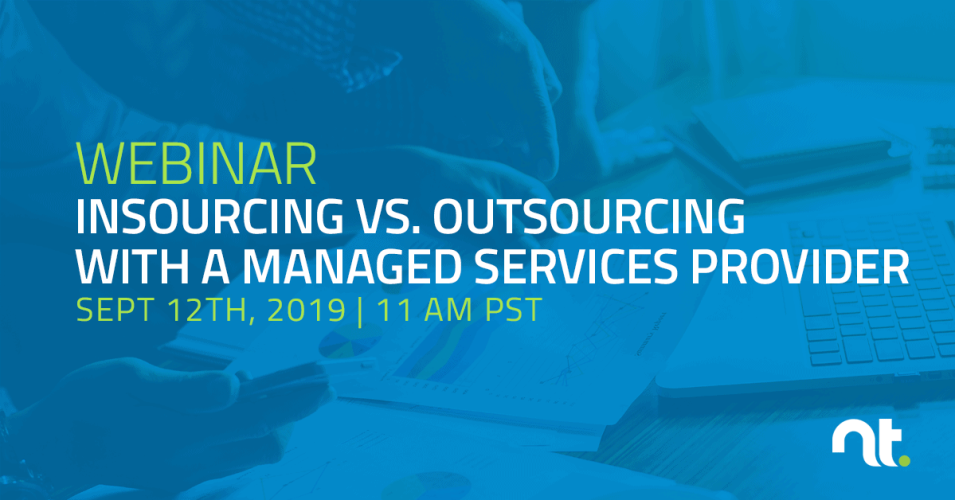READ TIME: 4 MIN

- September 10, 2019
The Great IT Debate: Insourcing vs. Outsourcing with a Managed Services Provider
Cloud computing, artificial intelligence, big data, machine learning, mobility, the Internet of Things—the list goes on. Each of these technologies, once considered “nice to have,” are now requirements for businesses and the responsibility of supporting these expanding suites of technologies requires a team of experienced IT professionals.
In recent years, traditional IT teams have been pushed to do more with fewer resources. As a result, there are inherent expectations to transform business models with the same, if not fewer resources.
For business leaders, the decision to insource (hire in-house) or outsource new IT functions requires careful consideration. Unfortunately, there is not a one-size-fits-all answer. Every organization is unique and as such has to decide on what’s best for their business.
In-House Staff for New IT Functions
Often a company will make the decision to devote resources and budget to hire a dedicated professional because they believe the full control of an FTE will produce better results. Unfortunately, better results are infrequent.
For those businesses that are considering internal IT staffing, consider the following topics:
Maintain Total Control
When IT operations are in-house, employees maintain all data, devices, line-of-business applications, hardware, and security. With this control comes the responsibility of responding to breaches and system failures, troubleshooting performance bottlenecks, and addressing requests from senior leadership. Note: While not beholden to third-parties, in-house teams that do not partner with outside resources have no external safety nets to help maintain uptime.
In-House Data Management
Especially in highly-regulated industries, total control of data can be a possible benefit for in-house IT operations. If your in-house IT is robust enough to handle storage, security, monitoring and reporting, then you may be “okay.” While total control of data is adopted by some, it does have its drawbacks. A select few (sometimes one person) are now responsible in controlling the safety of your data.
Why Outsource IT Services and Management
Outsourcing IT operations isn’t an all-or-nothing proposition. There are plenty of organizations with in-house IT teams that leverage a Managed Services Provider (MSP) to fill in gaps. A reputable managed IT services provider (MSP) can handle anything from cyber security to implementation projects, end-user troubleshooting support, and business continuity.
When it comes time to decide between hiring in-house, outsourcing to an MSP or finding an MSP to work with your in-house team, look for a partner who can deliver everything an internal IT team offers – and more.
Take Advantage of Specialized IT
It’s not always easy to find the perfect internal IT resource that will deliver the expertise necessary to capitalize on the latest technologies, as well as meet the current and future IT needs as your business evolves. With the right MSP, businesses large and small can take advantage of IT expertise that spans all technologies, applications, and systems. Rather than being limited to the skills of an in-house team, MSPs let you address issues faster and identify creative solutions to changing business challenges.
Maximize Productivity
Domestically outsourcing certain IT functions isn’t always an indictment of internal capabilities. Since IT teams are stretched so thin, outsourcing can be a great way to free up some time for internal teams. Rather than spending so much time keeping the lights on with lower-level tasks, an MSP can take on those functions so that in-house professionals can spend time making sure new projects succeed.
Leverage the Latest Solutions
Upgrading IT infrastructure is hard enough to do once, but when technology changes it’s almost impossible to force aging systems and solutions to keep pace with ever-growing demands. Outsourcing to a Managed Services Provider means taking advantage of an IT stack that is always evolving. MSPs have the ability to upgrade infrastructure to help your business take advantage of the latest technologies.
Access IT Consulting Services
Outsourcing IT functions doesn’t mean offloading in-house tasks. You also get the benefit of working with an MSP that can consult with you on the best approaches to business challenges. Maybe you’ve been approaching a certain business need in a way that costs more money than necessary. An MSP can spot inefficiencies and work with you to put more effective systems and processes in place.
Lastly, Consider Cost
After reading through this article, you’ll notice one glaring omission—costs. Most often, you’ll see reduced costs as a benefit of working with an MSP. While that might be the case in many instances, it’s hard to make that kind of sweeping generalization.
There needs to be much more evidence to support the claim that outsourcing IT with an MSP will cut costs in addition to the support you’ll receive. That’s why we’re hosting our latest webinar where you can see a live 5-year analysis of the costs associated with hiring in-house versus outsourcing to an MSP.
